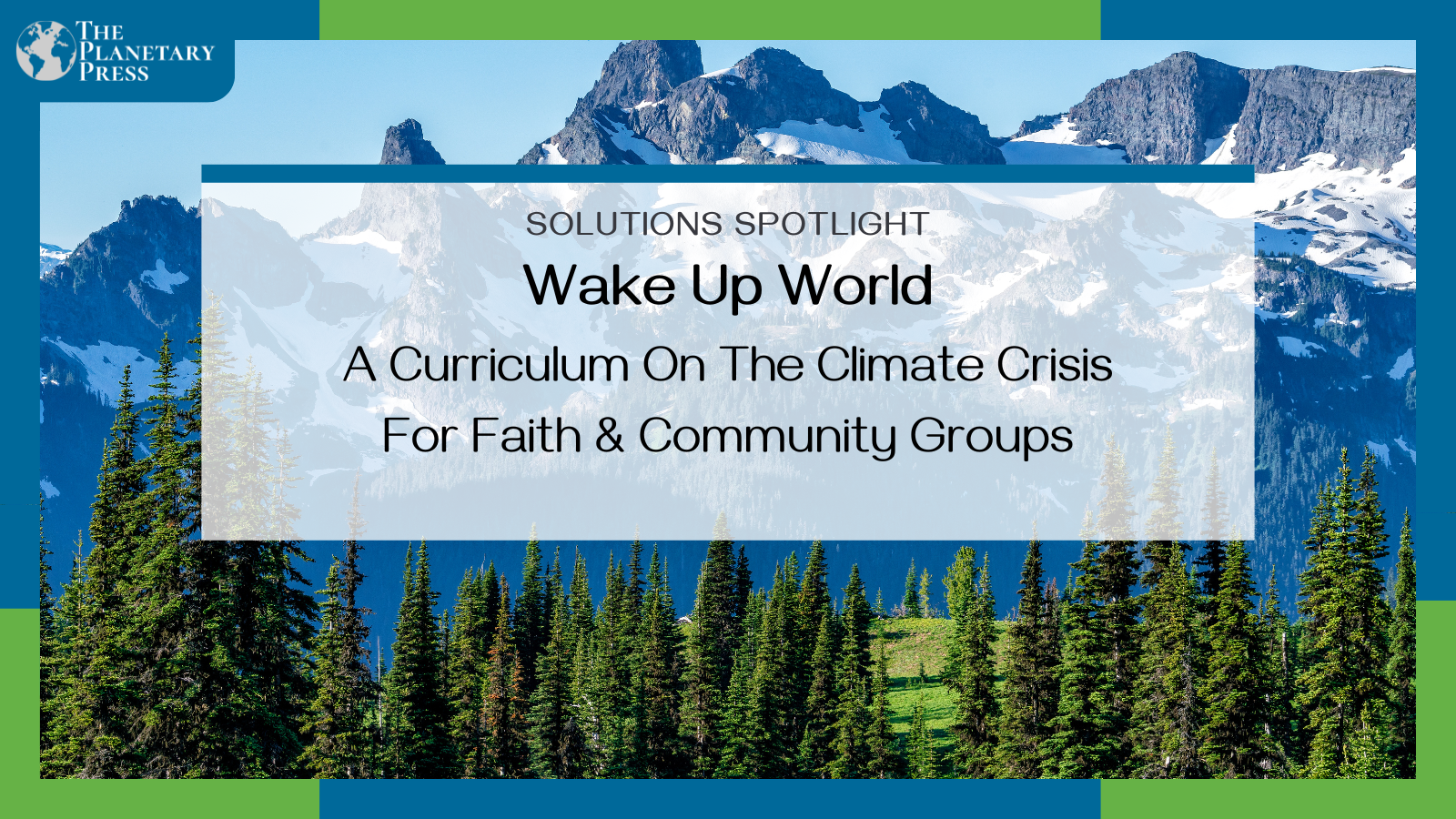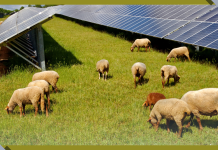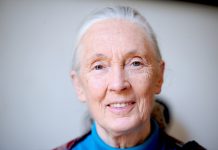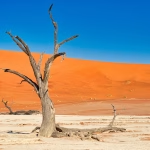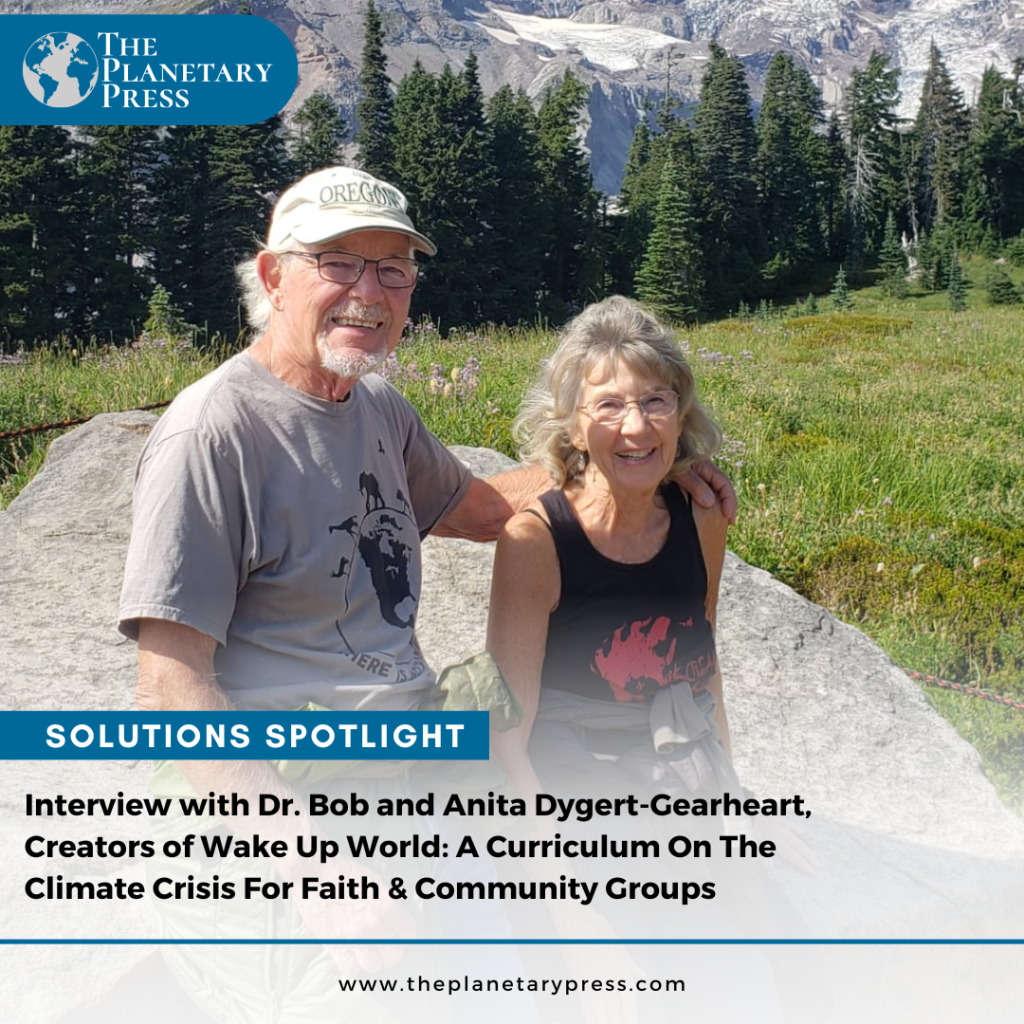
Please tell us more about yourselves and your backgrounds. How did you first get involved in the climate space?
Bob is a retired United Methodist Minister of 40-plus years. Anita is a retired clinical social worker. We have led lives of social awareness but had never really tackled an understanding of the climate crisis until 2021. With COVID-19 in full swing, having moved to a new community and in lockdown, we decided 2021 would be the year we would spend much of our time gaining an understanding.
We began by creating a book club of socially conscious friends and family and spent the year reading, watching, discussing, and experiencing the climate space. By late 2021 we were convinced that this is an existential crisis requiring the attention of many. We believe from our study that the creation of a strong grassroots of understanding and action is critical to the change that is necessary.
You recently launched Wake Up World, a curriculum to make climate science more accessible for faith communities. Can you tell us about the curriculum?
First, we began a search for a curriculum that we could promote to faith and interfaith groups; not finding a curriculum available, we felt called to create one. Wake Up World, A Curriculum on the Climate Crisis for Faith and Community Groups, was the result. It is non-political and ecumenical/interfaith. The science is based on that agreed upon by the vast majority of scientists.
The curriculum begins with what calls us to action, our values and sense of morality, our faith statements, as well as our deep appreciation for this beautiful world. The curriculum progresses to the basic science, how our choices and actions impact that science, creation justice issues, the roles that technology, faith groups, governments, and other partners can and are playing in finding solutions, and how we can create our own plans for action.
Why do you think it is essential to involve faith communities in climate action?
A grassroots of understanding and action are critical for solving this ecological crisis and moving to a more beautiful, more just, healthier, and compassionate world. With 80 percent of the world’s population identifying with a faith group, this makes faith communities of critical importance and a great resource for committed change and effective action.
Acts of service are at the heart of many faith organizations. Why do you believe faith organizations/communities are well suited for climate action?
Our faith is intimately connected to our sense of what is right, what is good, and where our individual and group responsibilities lie. A willingness to make significant changes for the common good is often motivated by our beliefs. Faith communities have resources for meeting spaces, a history of adult education, and a group of people who can talk and plan and act together.
People today are battling increased levels of climate anxiety and despair. When people first start to learn more about the climate crisis, it can be difficult to get past the doomed, fatalistic mindset of “It’s too late” or “I’m just one person. Does it really matter what I do?” How does your curriculum help its students get beyond despair?
We believe the emotional component of this ecological crisis is so important to recognize and face squarely. We certainly have gone through our own emotional roller coaster in the process of study and writing.
In the first class, we offer some resources for dealing with the anxiety and depression many of us feel as we learn more about the severity and urgency of the climate crisis. In each class, we encourage sharing our “emotional temperature” with each other with discussion around what is helping.
Studying this curriculum together can form a group of friends who can continue to be in contact for support. We are creating an advisory board, and one of our members is working on their doctoral program studying the psychological impacts of the climate crisis on humanity, which provides updated input into our curriculum.
Through the curriculum, we try to help people move to a place of agency as they discover what they love and how they can help to save it.
What do you hope people walk away with after completing your curriculum?
Our hope is to provide a broad understanding of the ecological crisis in which humanity currently finds itself, the many facets, and the many opportunities for effective action.
It is our hope that participants, once they have completed the curriculum, can use it as a resource to return to for information, but even more importantly, will be motivated to continue their study and will find their place for meaningful action. And we hope that it will give them the ability to talk to others about the climate crisis, to support their families and friends emotionally, and to use their votes, their voices, and their purchasing power to make a difference.
What actions can churches and faith communities take to be more environmentally sustainable?
The recent US Inflation Reduction Act provides resources to faith groups to retrofit their buildings through insulation, weather stripping, window caulking, electrification of their heating and cooling, and converting to renewable energy. For example, nonprofit organizations/churches can receive a direct payment from the federal government for up to 30 percent of a solar installation.
Retrofitting our old buildings is a very important piece of the puzzle.
Divesting from the fossil fuel industry in their investments and investing in socially responsible investments is important. Faith groups can also look at how they are using the earth as they gather to share meals (waste, plastic, styrofoam) and how they provide encouragement for ride-sharing, biking, and virtual meetings. Many faith groups are exploring how they can support biodiversity, build community gardens, support the pollinators, and use large lawn spaces in earth and people-friendly ways.
And most important of all, we believe, is educating their members. Until we understand the extent of this crisis, we do not know how to be a part of the solution.
What are some everyday action items you recommend for people to get started?
As we become educated, there are so many things we can do individually. We encourage people to explore the Creation Care Tips created by Crys Zinkiewicz from the UMC Creation Justice Movement.
In many ways, the changes we make become organic, so to speak. Education leads to understanding, leads to a desire to make a difference, to be a part of the solution. And suddenly, we are eating, buying, traveling, entertaining ourselves, relating to each other and all of creation differently. We stop wasting food, we buy locally, we make changes in our homes to move away from fossil fuel use, we plant a garden, we eat more plants and less meat, we plant trees, we ride our bikes and walk and share our rides, we use products made of bamboo, enjoy nature where we are. Together we are creating a new way of being, moving towards a sustainable future for the earth.
In preparing this curriculum, you both did a lot of reading. What book(s) do you recommend for people looking to make a difference for our planet?
On our website is a list of books we have found useful with a little description so people can find what calls to them. There are so many great books available it can be overwhelming.
Is there anything else you would like to share with our audience?
We would like to say thank you for every little and big thing each person and the many wonderful organizations are doing to move us from crisis to solution. Together we truly, truly can make a huge difference.

